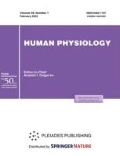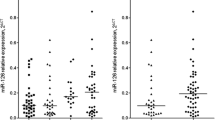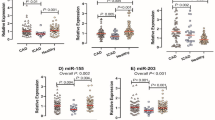Abstract
Atherosclerosis is a multifactorial disease and one of the leading causes of ischaemic stroke. In recent years, microRNA has become an important factor to consider in the pathogenesis of atherosclerosis. MicroRNAs are non-coding RNA sequences that are divided into proatherogenic and atheroprotective. This study evaluated the leukocyte expression of certain microRNAs (miR-126-(5p/3p), miR-29a-(5p/3p), miR-33a-5p and miR-21-(5p/3p)) in patients with carotid atherosclerosis. Statistically significant differences were found between patient groups in regard to the molecular levels, as well as correlations between several microRNAs. This indicates the potential use of microRNA in diagnosis and treatment, and confirms the role of microRNAs as important regulators of carotid atherosclerosis.



Similar content being viewed by others
REFERENCES
Chung, J.-W., Park, S.-H., Kim, N., et al., Trial of ORG 10172 in Acute Stroke Treatment (TOAST) classification and vascular territory of ischemic stroke lesions diagnosed by diffusion-weighted imaging, J. Am. Heart Assoc., 2014, vol. 3, no. 4, p. e001119.
Xu, S., Kamato, D., Little, P.J., Nakagawa, S., Pelisek, J., and Jin, Z.G., Targeting epigenetics and non-coding RNAs in atherosclerosis: from mechanisms to therapeutics, Pharmacol. Ther., 2019, vol. 196, pp. 15–43.
Raskurazhev, A.A. and Tanashyan, M.M., Role of microRNAs in cerebrovascular pathology, Ann. Clin. Exp. Neurol., 2019, vol. 13, no. 3, pp. 41–46.
Tajbakhsh, A., Bianconi, V., Pirro, M., Gheibi Hayat, S.M., Johnston, T.P., and Sahebkar, A., Efferocytosis and atherosclerosis: regulation of phagocyte function by MicroRNAs, Trends Endocrinol. Metab., 2019, vol. 30, no. 9, pp. 672–683.
Di Stefano, A.B., Massihnia, D., Grisafi, F., et al., Adipose tissue, angiogenesis and angio-MIR under physiological and pathological conditions, Eur. J. Cell Biol., 2019, vol. 98, nos. 2–4, pp. 53–64.
Siasos, G., Bletsa, E., Stampouloglou, P.K., et al., MicroRNAs in cardiovascular disease, Hell. J. Cardiol., 2020, vol. 61, no. 3, pp. 165–173.
Giral, H., Kratzer, A., and Landmesser, U., MicroRNAs in lipid metabolism and atherosclerosis, Best Pract. Res., Clin. Endocrinol. Metab., 2016, vol. 30, no. 5, pp. 665–676.
D’Ardes, D., et al., From endothelium to lipids, through microRNAs and PCSK9: a fascinating travel across atherosclerosis, High Blood Pressure Cardiovasc. Prev., 2020, vol. 27, no. 1, pp. 1–8.
Liu, C.-Z., Zhong, Q., and Huang, Y.-Q., Elevated plasma miR-29a levels are associated with increased carotid intima-media thickness in atherosclerosis patients, Tohoku J. Exp. Med., 2017, vol. 241, no. 3, pp. 183–188.
Ulrich, V., Rotllan, N., Araldi, E., et al., Chronic miR-29 antagonism promotes favorable plaque remodeling in atherosclerotic mice, EMBO Mol. Med., 2016, vol. 8, no. 6, pp. 643–653.
Price, N.L., Rotllan, N., Canfrán-Duque, A., et al., Genetic dissection of the impact of miR-33a and miR-33b during the progression of atherosclerosis, Cell Rep., 2017, vol. 21, no. 5, pp. 1317–1330.
Gangwar, R.S., Rajagopalan, S., Natarajan, R., and Deiuliis, J.A., Noncoding RNAs in cardiovascular disease: pathological relevance and emerging role as biomarkers and therapeutics, Am. J. Hypertens., 2018, vol. 31, no. 2, pp. 150–165.
Zhang, X., Price, N.L., and Fernández-Hernando, C., Non-coding RNAs in lipid metabolism, Vasc. Pharmacol., 2019, vol. 114, pp. 93–102.
Rayner, K.J., Sheedy, F.J., Esau, C.C., et al., Antagonism of miR-33 in mice promotes reverse cholesterol transport and regression of atherosclerosis, J. Clin. In-vest., 2011, vol. 121, no. 7, pp. 2921–2931.
Ouimet, M., Ediriweera, H.N., Gundra, U.M., et al., MicroRNA-33-dependent regulation of macrophage metabolism directs immune cell polarization in atherosclerosis, J. Clin. Invest., 2015, vol. 125, no. 12, pp. 4334–4348.
Zhang, X., Shao, S., Geng, H., et al., Expression profiles of six circulating microRNAs critical to atherosclerosis in patients with subclinical hypothyroidism: a clinical study, J. Clin. Endocrinol. Metab., 2014, vol. 99, no. 5, pp. E766–E774.
Park, M.Y., Herrmann, S.M., Saad, A., et al., Circulating and renal vein levels of microRNAs in patients with renal artery stenosis, Nephrol., Dial., Transplant., 2015, vol. 30, no. 3, pp. 480–490.
Pereira-da-Silva, T., Coutinho Cruz, M., Carrusca, C., Cruz Ferreira, R., Napoleão, P., and Mota Carmo, M., Circulating microRNA profiles in different arterial territories of stable atherosclerotic disease: a systematic review, Am. J. Cardiovasc. Dis., 2018, vol. 8, no. 1, pp. 1–13.
Koroleva, I.A., Nazarenko, M.S., and Kucher, A.N., Role of microRNA in development of instability of atherosclerotic plaques, Biochemistry (Moscow), 2017, vol. 82, no. 11, pp. 1380–1390.
Author information
Authors and Affiliations
Corresponding author
Ethics declarations
COMPLIANCE WITH ETHICAL STANDARDS
The study was conducted in accordance with the ethical standards set out in the Declaration of Helsinki 1964 and its subsequent revisions, and approved by the Local Ethics Committee (Minutes of meeting no. 11-4/19 dated 20/11/19); all patients provided written voluntary informed consent.
AUTHOR CONTRIBUTIONSRaskurazhev A.A.—grant executor, study initiator, concept, plan and methodology development, statistical processing, writing the initial version of the manuscript.Tanashyan M.M.—creating the research concept, monitoring the execution, final review of the manuscript.Shabalina A.A.—preparing the laboratory protocol for microRNA study, performing the tests, statistical data processing.Kuznetsova P.I.—patient recruitment for the study.Kornilova A.A.—grant co-executor, patient recruitment for the study, database management, manuscript preparation.Burmak A.G.—performing laboratory tests, taking blood samples for the study.
FINANCING
Grant no. МК-3978.2019.7 of the President of the Russian Federation (Ministry of Science and Higher Education of the Russian Federation).
Rights and permissions
About this article
Cite this article
Raskurazhev, A.A., Tanashyan, M.M., Shabalina, A.A. et al. Micro-RNA in Patients with Carotid Atherosclerosis. Hum Physiol 46, 880–885 (2020). https://doi.org/10.1134/S0362119720080113
Received:
Published:
Issue Date:
DOI: https://doi.org/10.1134/S0362119720080113




